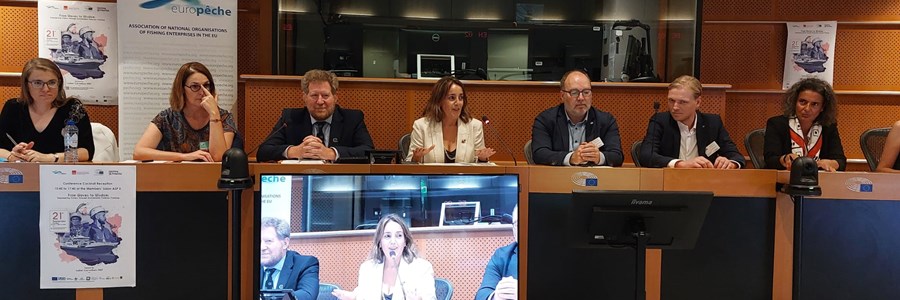Conference on Sustainable Fisheries Training Charts International Milestone

The ‘From Waves to Wisdom: Empowering Fishers through Sustainable Fisheries Training’ Conference, held on September 21, 2023, was a resounding success in fostering dialogue and promoting sustainable practices within the fisheries industry. The Conference, hosted by MEP Isabel Carvalhais, marked the culmination of the EU co-funded project called 'Catching the Potential.' This project has been pivotal in defining a sustainable fisheries training standard and advocating for its integration into the International Convention on Standards of Training, Certification, and Watchkeeping for Fishing Vessel Personnel (STCW-F). Bringing together relevant experts, stakeholders, and policymakers, the event delved into the significant role of sustainable fisheries training in enhancing the interaction between fishing activities and the marine ecosystem. It concluded with a compelling resolution underscoring the critical importance and urgent need of a comprehensive and standardised approach to sustain
The Conference participants appreciated the clear commencing message from the host, MEP Isabel Carvalhais, calling for a proper sustainable fisheries training framework within the EU. Likewise, DG MARE highlighted the important role of training in promoting sustainable fisheries and enhancing interactions between fishing and the marine ecosystem.
Michael Kingston, International Maritime Organization (IMO) expert presented the essential work conducted by the IMO in training fishers and the ongoing revision of the STCW-F Convention. Florence Poulain from the Food and Agriculture Organization (FAO) stressed that in spite of technological progress, fishing is still one of the most dangerous occupations. She shared insights on FAO’s fisheries training initiatives, implementation of international fisheries instruments like the Code of Conduct for Responsible Fisheries (1995), and the safety codes, safety recommendations and safety at sea best-practice guidelines jointly developed by FAO/IMO/ILO.
The event continued with a dive into the Catching the Potential project. Tim Haasnoot, Director of ProSea Marine Education, project leader, detailed the notable accomplishments in producing the basis for an EU fisheries training standard. Alexandra de Carvalho dos Santos Garcia Guerreiro from the Azores, Portugal, presented country-specific training experiences and their substantial contribution to the local fishing industry.
The Conference concluded with a stimulating panel discussion on ‘Unleashing the Potential: Standardising Sustainable Fisheries Training’. Distinguished panellists including Cor Blonk, expert in labour relations at the Pelagic Freezer-trawler Association and Chair of the European Social Dialogue Committee for Sea Fisheries, discussed hands-on strategies to standardise sustainable fisheries training to be implemented in the EU.
In her closing remarks, Isabel Carvalhais summarised the event's key takeaways, emphasising that 2023 marks a key moment for the fishing industry to prioritise updated competencies. Mutual recognition of certificates and the free movement of labour should be fostered. The fisheries sector has significantly evolved over the past decade, necessitating fishing professionals to equip themselves with knowledge and skills relating to people, planet, and profit, hence the three pillars of sustainability. This strategic approach positions fishers as sustainable entrepreneurs, providing a vital, healthy food source for current and future generations.
This event, a strong ending to the Catching the Potential project and the unveiling of the project’s resolution, garnered high-level attention from key players in the international arena. It shed light on the intrinsic value of investing in fishers' competencies. Fishers play a central role in realising the sustainability objectives outlined in the Common Fisheries Policy. Investing in the training infrastructure for fishers within the EU not only enhances industry capacities but moreover, it underscores the focal role of EU policymakers in championing vocational training, certificate recognition, career advancement, and the growth of a prosperous, socially accepted fishing industry committed to the well-being of our seas.
About the project
Stakeholders in the consortium conducted pilot trainings in seven EU member states and formulated an international standard for sustainable fisheries training. This training is vital due to the evolving fishing profession, necessitating new knowledge and skills. It encompasses marine environment, fisheries management, economics, and societal interactions, aligned with sustainable development pillars - People, Planet, and Prosperity.
The project consortium strategically engaged in the revision of STCW-F, advocating sustainable fisheries training in the international training requirements set by the IMO, with vital support from the FAO and the International Transport Workers' Federation (ITF). This advocacy led to uniform competence requirements for fishers, expected to solidify with the STCW-F revision in fall 2023. Alongside the training standard, the project provides guidelines for trainers and governments. All efforts combined generated valuable insights, messages, and pressing calls reflected in the consortium's resolution for reference.
Ends
For press contact:
Rosalie Tukker, Senior Policy Advisor of Europêche: +32 2 230 48 48 rosalie.tukker@europeche.org
Sources: Europêche